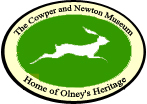|
THE MUSEUM PEOPLE
WORKS ORCHARD SIDE GARDENS |
 |
|
The Cowper and Newton Museum
|
||
|
Cowper & Newton Day 2002
|
||
The Annual Cowper and Newton Day was held on Saturday 27 April, and was very well supported by about 80 visitors from both near and far - including Helen Martin and her party plus Ina Adler, all from the USA, who of whom came over specially for the occasion. The theme for the day was the friendship of John Newton and William Cowper, and their collaboration on the Olney Hymns. The weather was not quite as balmy as in previous years, but fortunately the programme this time did not include any outdoor activities. Following the by now well-established pattern, proceedings began with two lectures at the Olney Centre in the morning, chaired by Professor Vincent Newey; in the afternoon there was a tour and concert in the Parish Church, and a session of readings in the Museum; and the day was rounded off by dinner in the evening, again at the Olney Centre. Running concurrently with the events was a most informative exhibition on Newton and the John Newton Project (see elsewhere in this issue for details) created and set up by Marylynn Rouse. The Olney Hymns Professor J R (Dick) Watson, Emeritus Professor of English Studies at the University of Durham, gave the first lecture, on the Olney Hymns (published in 1779) and their place in the English hymn tradition. As author of the definitive study of the latter, The English Hymn, he treated the audience to a richly referenced and wide-ranging overview of the writing of the Hymns, the different approaches of Cowper and Newton to the task, and their relation, doctrinally and stylistically, to the Evangelical Revival and to other hymn-writers of the time such as John Wesley. He pointed out that there was far from universal agreement amongst Evangelicals about predestination and the operation of grace, and that the Olney Hymns reflect the typical vacillation between doubt and faith in the convert’s daily experience. He concluded that for two wonderful, sunny years Cowper and Newton were able, through their collaboration, to confront the difficulties in their own personal histories and temporarily to overcome them, before the clouds returned and Cowper had to abandon his part of the project. Melancholy and Religion The second paper, on Cowper, Melancholy and Religion, was read by Tony Seward, as the author, Rt. Revd. Professor Stephen Sykes, was not able to attend in person. Professor Sykes, formerly Bishop of Ely, is Principal of St. John’s College, University of Durham. He traced the history of Cowper’s five main periods of acute depressive illness, culminating at the end of his life in almost six years of unrelieved depression. Between these episodes he was well for long periods of time and able to work hard and constructively. The major question which has occupied commentators ever since is how far Cowper’s illness stemmed from his particular experience of Evangelical religion. In Professor Sykes’s view, he never gave way permanently to despair that God had abandoned him (as Lord David Cecil would have it), but was engaged in a continuing dialectic, with the comforting words of his friends at one pole and the despairing passages of Scripture - some of the Psalms, parts of the Book of Job - at the other. Mrs. Pauline Watson provided further insight in the subsequent discussion, giving her view, as a psychiatrist, of Cowper’s illness. At the Parish Church In the afternoon, Mrs. Elizabeth Knight led a comprehensive tour of the parish church, its monuments and furnishings, with many interesting anecdotes of the personalities involved over the years. The concert that followed was beautifully led by the church choir conducted by Stephen Chilvers, and soloists Jillian Chilvers and Ann Harris, together with Richard Heyes and Stephen Chilvers on organ and Matthew Ball on trumpet. The congregation joined vigorously in the singing of five of the Olney Hymns, which were interspersed by choral settings of others, and soprano solo, organ and trumpet pieces by contemporary composers such as Samuel Wesley, Handel and John Stanley. Favourite Hymns We then moved to Cowper’s bedroom in the Museum, and an informal session was devoted to participants reading and discussing ‘My Favourite Hymn’. This usefully illuminated the circumstances in which some of the hymns were composed, and ended - to the credit of Vincent Newey, who successfully encouraged everyone to overcome their inhibitions! - in a rousing impromptu singing of ‘Amazing Grace’, and ‘How sweet the name of Jesus sounds’! Dinner The dinner was as convivial as ever, and concluded with a highly amusing speech by Rev. Nigel Pond, Rector of Olney, in which Nigel interspersed his own observations on Cowper with some slightly broad anecdotes at which the poet himself might have blushed, though he would no doubt have appreciated their wordplay! So ended the third annual celebration of Cowper and Newton, once again a successful occasion enjoyed by all. We look forward to welcoming everyone who is able to join us again in Olney next year on the last Saturday of April, and will circulate details as soon as a theme has been decided. Tony Seward and George Davies |
||
|
|


